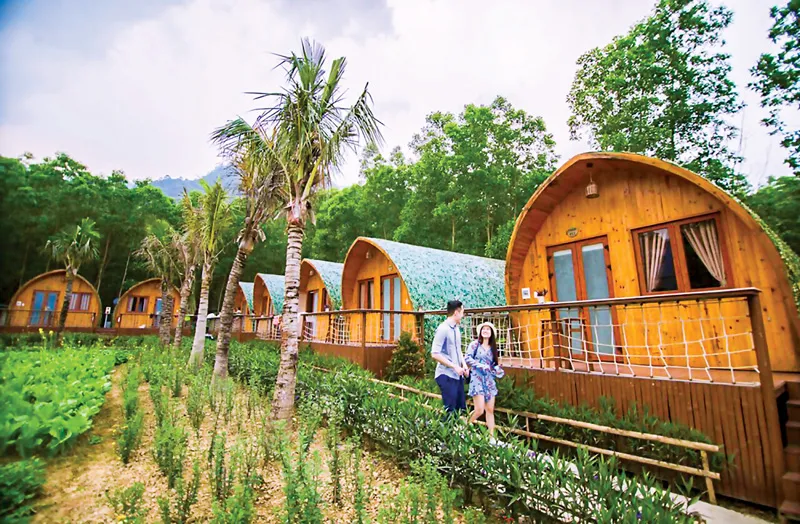
Prof. Dang Hung Vo, former Minister of Natural Resources and Environment, spoke with Saigon Investment on farmstay businesses that are springing up across cities and provinces in the country.
JOURNALIST: - Sir, soon after the trend in investing in condotels slowed down, investors began to pour considerable amounts of money in farmstay businesses in different cities and provinces across the country. People have varied opinions on this new trend of business. What is your opinion on this form of investment?
Prof. DANG HUNG VO: - Farmstay business is not new in Vietnam and has been common in many countries for decades, though in Vietnam it was introduced just a few years ago. Farmstay business means that we are using farmland for developing an accommodation service intended mainly for tourists on a long holiday or international visitors interested in a traditional and cultural experience in different regions of the country. More clearly, it is a business service for visitors to experience the indigenous lifestyle of people in that region while they holiday.
In Vietnam, this type of business is encountering a number of difficulties for some reasons. First, it is a sort of accommodation service for holidaymakers, but it is provided on land meant for farming or forestry while Vietnamese laws now do not recognize farmland as a product of the real estate market. This is also clearly stipulated in the Civil Code and the Land Law revised in 2013, and the Real Estate Business Law of 2014. We think that this product must be marked as a real estate market investment. Construction works on farmland, which later become real estate products, are not in accordance with legal regulations. As a result, a farmstay service cannot be a type of real estate business.
Second, our farmland is now used mainly for farming, and the Vietnamese laws do not allow construction of infrastructure facilities, houses, hotels and recreational structures on farmland. This means that farmstay services are permissible by law as long as a farmer welcomes visitors to the farm as a way of increasing the value of the farmland by providing services such as community tourism, ecotourism or indigenous tourism. However, it would be illegal if a land owner built houses, hotel rooms or recreational facilities, or raised capital for establishing real estate structures on the farmland.
- Sir, recently it is seen that quite a few pieces of farming or forestry land have been used for farmstay businesses in several cities and provinces across Vietnam. Some investors have even raised funds from other investors at high annual returns. What risks do you think such activities could possibly cause?
- Investors and real estate business people tend to take advantage of certain market trends to make their business plans, and then they give presentations and advertise their products to raise capital from different sources. Currently there is no risk management regulation that prevents these business activities. The same problem once happened in golf course projects. Along with golf courses, they built guesthouses, hotels and recreational facilities on golf courses. Such real estate activities are against the law and different from the initial purpose of developing a golf course. A similar problem is now being repeated in farmstay business activities. If such farmstay services are allowed to develop, they will pose lots of risks for secondary investors, and will also hurt or twist the real estate market.
First, investors should know whether a new form of business activity is allowed by law and whether they can be legally protected. These farmstay business activities are not protected by law yet. Second, real estate products must be the result of real estate projects. Farmstay activities are not connected to any real estate project in their area, therefore the services provided in farmstay businesses are no more than just a deal between a customer and the provider. Third, farmstay business activities do not guarantee interest, financial benefits or transparency. I suppose that farmstay business activities are very risky in legal terms and in planning and financial issues.
- Sir, do you think there are loopholes in legal regulations on land management and real estate business activities which now need to be revised?
- There are legal regulations on transaction of real estate products that will come into existence in the future, but there are no specific regulations on other related areas. Not very long ago, a form of condotel business activity was introduced, but such activity was not allowed by law. I believe that we need to take into consideration a larger scope so that we can develop a more specific and effective legal framework for all business activities relating to real estate products. We also need legal regulations on other real estate activities, not just housing. For instance, we may legalize real estate products for tourism services.
Lately, condotels were introduced by investors while they were not even permitted by law. I suppose that products in other areas like entertainment, recreation, industrial real estate services can be treated as forms of real estate products. To make such activities legal, the laws on land and real estate services need to be revised to meet the current requirements. Additionally, there must be a mechanism for management of risks in this business area, otherwise, capital raising will become chaotic and pieces of land will be used for wrong purposes, projects will be twisted, and all this will create many problems that will affect sustainable development and cause more unwanted development in the real estate market.
- Thank you very much.




















